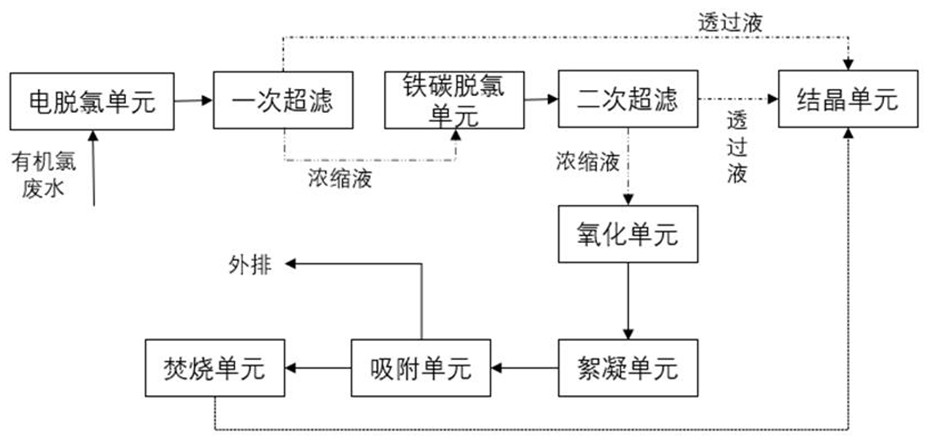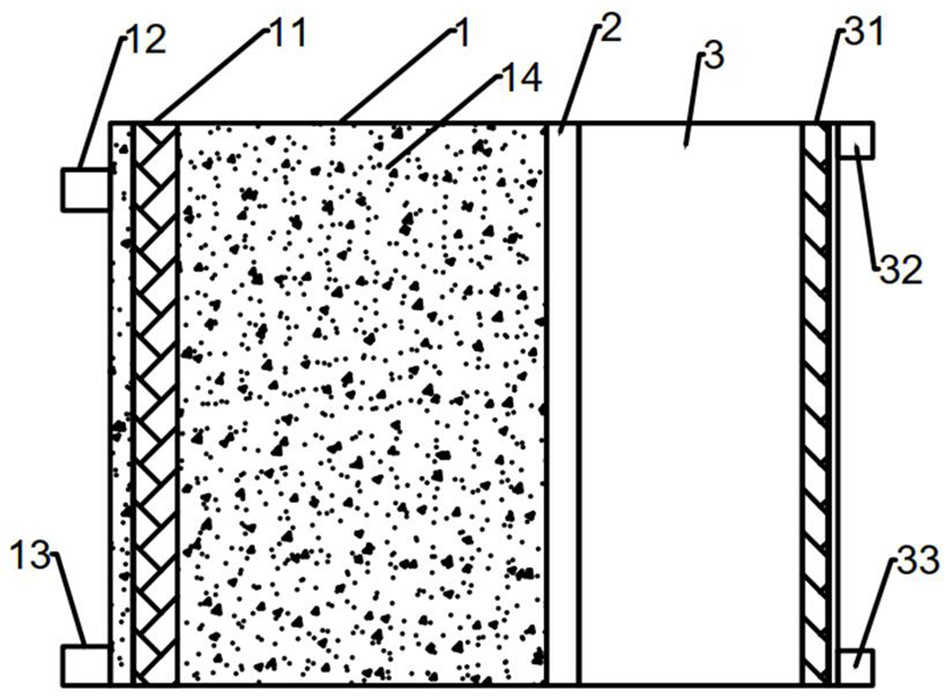A system for treating organochlorine wastewater by coupling technology of electric dechlorination and chemical dechlorination
A technical treatment, organochlorine technology, applied in the direction of special compound water treatment, oxidized water/sewage treatment, filtration treatment, etc., can solve the problems of unrealized organochlorine dechlorination and low efficiency of organochlorine dechlorination, and reduce subsequent treatment amount, improve the treatment effect, and improve the effect of pollutant concentration
- Summary
- Abstract
- Description
- Claims
- Application Information
AI Technical Summary
Problems solved by technology
Method used
Image
Examples
Embodiment 1
[0029] The pretreated organic chlorine wastewater contains 89mg / L of carbon tetrachloride;
[0030] The organochlorine wastewater is treated by an electric dechlorination unit with a current density of 20mA / cm 2 , the hydraulic retention time is 12min, and the concentration of carbon tetrachloride is reduced to 1.6mg / L; the concentration of organic chlorine compounds after the initial ultrafiltration and concentration is 119.8mg / L, and it enters the iron-carbon dechlorination unit for treatment. After the hydraulic retention time is 30min, organic chlorine compounds Chlorine concentration is reduced to 1.9mg / L, continue the second ultrafiltration and concentration, and then transport it to the oxidation unit for oxidation treatment of organic chlorine wastewater. After oxidation unit treatment, the concentration of organic chlorine in the effluent is 0.53mg / L, followed by flocculation unit and adsorption unit for treatment Finally, the sediments from the adsorption unit and fl...
Embodiment 2
[0032] The pretreated organic chlorine wastewater contains 89mg / L of carbon tetrachloride;
[0033] The organochlorine wastewater is treated by an electric dechlorination unit with a current density of 20mA / cm 2 , turn on the ultrasonic processing device, the ultrasonic frequency is 25kHz, and the sound intensity is 35W / cm 2, the hydraulic retention time is 12min, and the concentration of carbon tetrachloride is reduced to 0.72mg / L; the concentration of organic chlorine compounds after one ultrafiltration concentration is 91.2mg / L, and it enters the iron-carbon dechlorination unit for treatment. After the hydraulic retention time is 30min, the organic chlorine The concentration is reduced to 1.4mg / L, continue to be concentrated by ultrafiltration for the second time, and then transported to the oxidation unit for oxidation treatment of organic chlorine wastewater. After the oxidation unit is treated, the concentration of organic chlorine in the effluent is 0.21mg / L. After subs...
Embodiment 3
[0035] The concentration of organic chlorine in the concentrated medical organic chlorine wastewater after pretreatment (air flotation, oil separation) is 0.63wt%;
[0036] The organochlorine wastewater is treated by an electric dechlorination unit with a current density of 10mA / cm 2 , ultrasonic frequency at 25kHz, sound intensity at 35W / cm 2 , the hydraulic retention time is 12min; the concentration of organic chlorine compounds after the first ultrafiltration concentration is 1.12wt%, and it enters the iron-carbon dechlorination unit for treatment. After the hydraulic retention time is 23min, the organic chlorine concentration is reduced to 0.02wt%, and the second ultrafiltration concentration is continued After that, it is sent to the oxidation unit to oxidize the organic chlorine wastewater. After the oxidation unit is treated, the organic chlorine concentration in the effluent is 0.009wt%. After subsequent treatment by the flocculation unit and the adsorption unit, the s...
PUM
 Login to View More
Login to View More Abstract
Description
Claims
Application Information
 Login to View More
Login to View More - R&D
- Intellectual Property
- Life Sciences
- Materials
- Tech Scout
- Unparalleled Data Quality
- Higher Quality Content
- 60% Fewer Hallucinations
Browse by: Latest US Patents, China's latest patents, Technical Efficacy Thesaurus, Application Domain, Technology Topic, Popular Technical Reports.
© 2025 PatSnap. All rights reserved.Legal|Privacy policy|Modern Slavery Act Transparency Statement|Sitemap|About US| Contact US: help@patsnap.com


